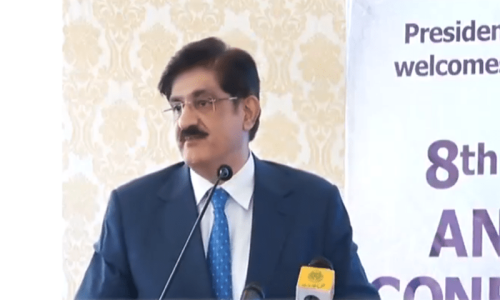 KARACHI, Jan 22: The provincial environmental agency chief endorsed before the Sindh High Court on Thursday the ban on polythene and plastic bags.
KARACHI, Jan 22: The provincial environmental agency chief endorsed before the Sindh High Court on Thursday the ban on polythene and plastic bags.
Sepa director-general Naeem Mughal said the non-degradable bags constituted a grave threat to the environment and public health and the ban could only be faulted for being rather late.
The bags get stuck in sewers and other places and create cesspools of water that soon develop into breeding spots for bacterial and viral diseases and pollute the environment.
Assistant Advocate-General Adnan Karim Memon said the impugned notification issued under Section 144 of the criminal procedure code was issued by the home department at the request of the city district government.
It was fully covered by the Sindh Prohibition on Manufacture, Sale and Use of Polythene Bags Ordinance, 2006. The ordinance banned all bags above 30 microns in thickness.
The ordinance was promulgated in pursuance of Section 24 of the Environmental Protection Act of 1997. The manufacture, sale and use of polythene bags, he said, were a cognizable offence punishable with six months of imprisonment or Rs100,000 in fine or both.
He sought time to file detailed comments on behalf of the home department. Other South Asian countries have imposed identical curbs, the AAG said.
Advocate Khalid Jawed Khan, counsel for the petitioner manufacturers’ association of polythene bag manufacturers, said the ordinance had also been challenged as being repugnant to the freedom of trade ensured by the Constitution.
The division bench comprising Justices Khilji Arif Hussain and Arshad Noor Khan adjourned further hearing to Feb 19 and also extended its injunction restraining the respondents from acting against the manufacturers and dealers of polythene bags.
NBP workers plea
The bench reserved its order on several petitions moved by former employees of the National Bank of Pakistan who were induced to accept a golden handshake in 1997 but were actually retired much later. The employees, ranging from a senior executive vice-president to clerks, said a 100 per cent pay increase and other benefits were announced after 1997 but they were held ineligible for accepting the severance scheme.
Advocate Islam Hussain, the petitioners’ counsel, cited a 2004 Supreme Court judgment declaring that an employee shall be paid all financial benefits till he was actually relieved of work and not till the date he opted to retire under the golden handshake scheme.
Contempt notice
Another division bench consisting of Chief Justice Anwar Zaheer Jamali and Justice Faisal Arab issued provincial education secretary Rizwan Memon a notice in a contempt application moved by the National Education Society.The petitioner society submitted through Advocate Syed Ishrat Ghazali that it owned and managed the Aziz National School in Block 12, Federal ‘B’ Area, Karachi. The institution was taken over by the government along with other institutions in the early 1970s. While all other ‘nationalised’ schools were handed over to their former owners, the petitioner society was discriminated against and arbitrarily denied the return of its school. The education department continued to retain possession of the school despite a policy decision taken by the cabinet in September 2001.
The society said it was compelled to file a petition in the high court to seek enforcement of its right. A division bench ordered the education department on February 15, 2008, to return the school to the society within three weeks. However, the education department failed to comply with the order within the stipulated time or any time thereafter. The order was yet to be complied with, though almost a year had passed since it was made. The society said the education secretary had committed contempt of court and should be proceeded against for the offence.














































Dear visitor, the comments section is undergoing an overhaul and will return soon.